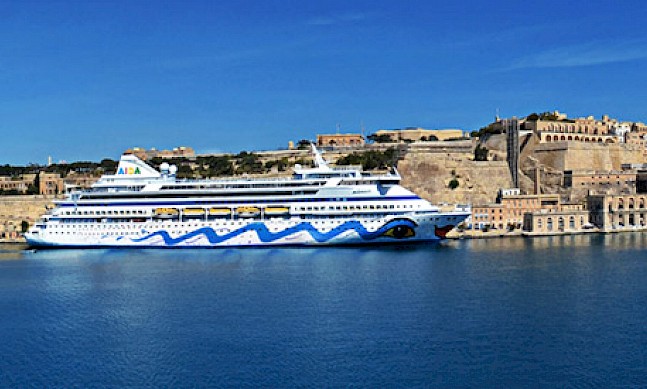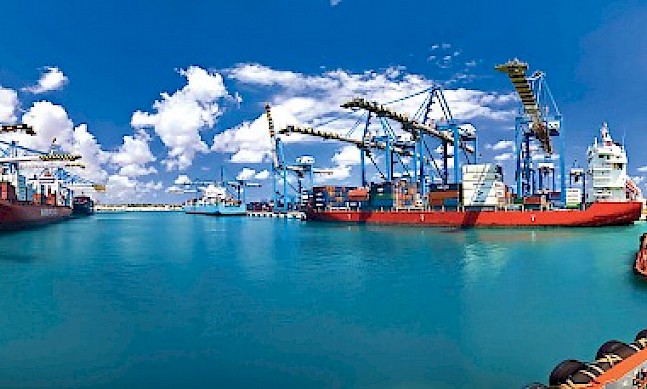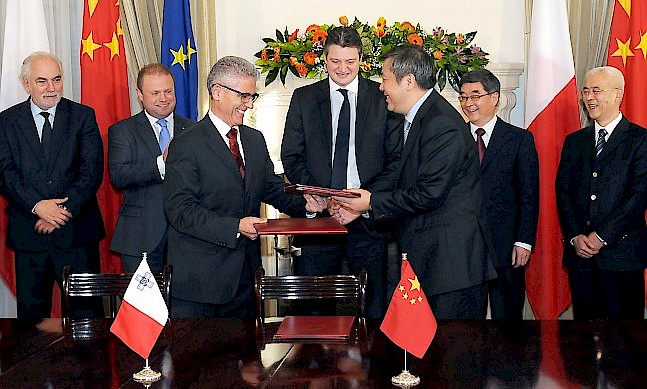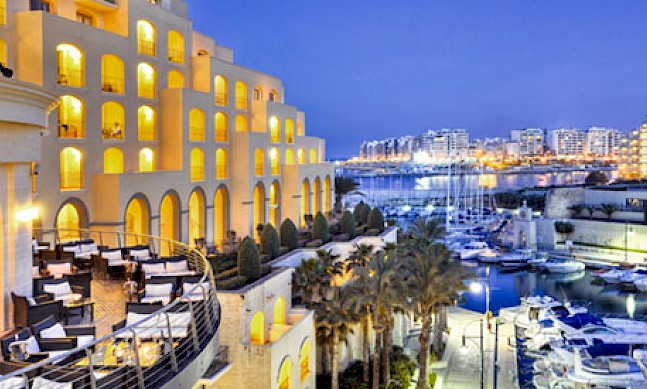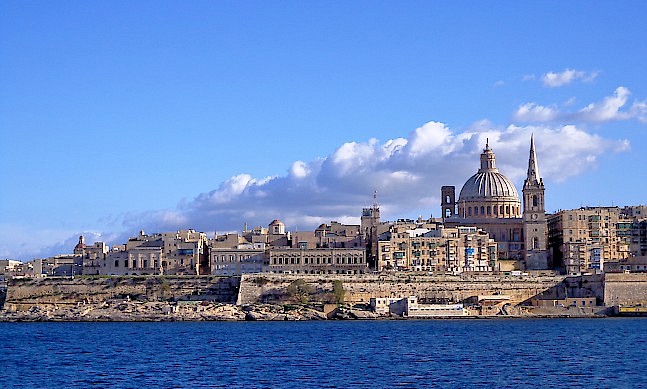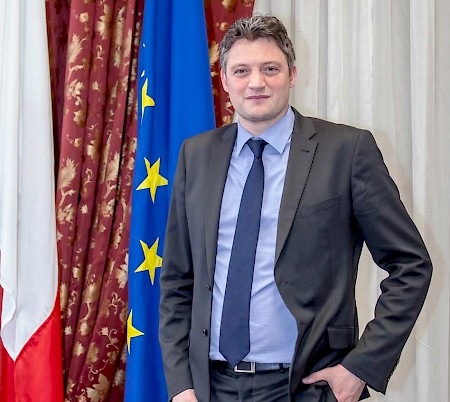
Malta’s energy sector reform, which will see the cost of electricity production fall as well as a shift away from a dependence on fuel oil, is already well underway. With Chinese collaboration in state energy provider Enemalta, and multinational consortium ElectroGas taking part in the construction of a gas storage facility and new gas-fired power plant, the sector has also thrown the doors open to foreign investment. Konrad Mizzi, Maltese energy minister, spoke to The Report Company about this transformative energy plan.
The Report Company: What are your ministry’s top priorities for the energy sector?
Konrad Mizzi: We inherited an energy sector which required substantial and significant restructuring. We wanted to ensure that the tariffs which we charge to the consumers are reasonable. Before the election we made a pledge to reduce our electricity tariffs by 25 percent for industry as well as for families and businesses. That was our priority to start with.
We have initiated a major investment programme in Malta to convert our electricity generation from fuel oil to natural gas. That project is on track; it will be operational in 2015 and the project has enabled the reduction in tariffs for families this year and from next year for businesses. Through the project we will be in a position to reduce emissions significantly. This has been done through foreign investment. We believe that foreign investment has an important part to play in the energy sector, both in meeting capital requirements as well as bringing in the expertise required to develop ambitious programmes within a very short timeframe.
Another key dimension that we needed to address was the Enemalta operation. Recently, Standard & Poor’s changed the outlook for the company from negative to stable, which is a very positive development, and it made note that the government intends to restructure the organisation and bring in a new strategic partner which will be Shanghai Electric Power, which is a subsidiary of China Power Investments. That is also a major milestone for us, and essentially it will enable the restructuring of Enemalta’s balance sheet as well as the transformation of the corporation.
The third element which is quite important for us as well is renewable energy, where we expect and require significant private sector investment in renewable sources, particularly solar, to achieve our 2020 targets. We look forward to foreign investment in this field.
A sector which is often not mentioned is water. Malta is dependent on desalination plants; our groundwater sources have been depleted significantly so we are embarking on very ambitious programmes where we will create new water from sewage effluent, which will be a first for the country, all within the next few years.
Besides the inward focus, we also look outwards and we would like to promote Malta as a hub for energy-related services. Our geographical location provides us with an ideal platform for us to be able to service Europe and North Africa. Most of the oil as well as gas shipments pass in close vicinity to us, which provides us with significant opportunities for the future. It’s also worthwhile highlighting that Shanghai Electric intend to set up in Malta an energy service centre which will service their operations in Europe as well as Africa and Turkey.
“We have initiated a major investment programme in Malta to convert our electricity generation from fuel oil to natural gas. That project is on track; it will be operational in 2015 and the project has enabled the reduction in tariffs for families this year and from next year for businesses.”Post This
TRC: What are your plans to change the energy mix in Malta?
KM: Before, Malta had 100 percent oil-fired power stations, very little renewable energy and the sector was fully government owned. We are going for a completely different mix of energy whereby we are going to have gas-fired power stations, significant investment in renewables which will include solar, waste-to-energy and biofuels, fuel oil will disappear from the generation mix completely, and we’re also going to have a power interconnection between Malta and Sicily which will enable us to buy electricity over the grid.
In terms of ownership, we believe that to deliver these projects we need strategic partners. We have already identified an international consortium, ElectroGas, which is building a new power plant, and now we have found another partner through Shanghai Electric Power so we are moving to more hybrid arrangements. I believe in the private sector and I believe that change is driven through private enterprise and partnerships. I believe that government has an important role to play but we welcome foreign investment in Malta and that investment was also welcomed by Standard & Poor’s.
TRC: What type of investment are you looking for into the sector and what are the main projects underway currently?
KM: On the generation side we have ElectroGas now in place. Shanghai Electric is coming into the Enemalta corporation. In the petroleum sector, for the use of inland fuels as well as jet fuels, Malta will be looking for international partners. In the renewable energies field, Enemalta will have a role to play but most of the investment will be undertaken through PPPs with the private sector.
TRC: Within the energy sector, the environment is always an important consideration. What is being done in Malta to maintain a balance between development and environmental protection?
KM: We will move away from Heavy Fuel Oil by 2015. The shift to gas will actually mean that we’re going to have 50 percent less emissions, 90 percent less particulate matter coming out of the chimneys, and no sulphur which is going to make a big difference to the residents. We have been committed to following due process in line with EU regulations, so the new power station project and gas supply has been subjected to a number of environmental impact studies.
TRC: How would you assess the relationship with China, particularly in terms of the energy sector?
KM: The relationship with China started in the 1970s and successive governments maintained that relationship and developed various areas of collaboration across the board. What was missing when we came into the administration was significant investment from China to Malta and the understanding that Malta could eventually act as an important hub for China with southern European partners as well as North Africa and potentially Sub-Saharan Africa. Malta is a safe country; it’s welcoming and people who come here genuinely fall in love with the country. We try to cut bureaucracy and make things happen really quickly and given that we are a small country we provide access to business and we can do things rapidly. I think there was a need that people in China were made more aware about our potential and what we could offer. We do have now first mover companies coming to Malta to look at opportunities in the energy sector. We welcome Chinese investment into Malta and we will facilitate the use of Malta as a hub for services entering into Europe. This is to a certain extent what we have done with Shanghai Electric.
“We believe that foreign investment has an important part to play in the energy sector, both in meeting capital requirements as well as bringing in the expertise required to develop ambitious programmes within a very short timeframe.”Post This
TRC: What are the plans to make Enemalta a profitable company?
KM: We have signed an MOU with China Power Investments, which is the parent company of Shanghai Electric. Shanghai Electric Power is partially listed on the Hong Kong and Shanghai stock exchanges. It’s a very forward-looking company in the Chinese power sector. They have investments in Africa and ambitions in Europe. After the signing of the agreement we are now in a process where we’ve agreed on the key principles for the investment into Enemalta and together with Shanghai Electric over the last month we have defined a business plan to turn around Enemalta and to make it profitable.
TRC: What is the timeframe for this?
KM: Our target is very clear: we want Enemalta to come into the black and we’ve got a three-year short-term plan to do so. The target is to bring it to breakeven earlier than that and maintain a steady return. We think the targets are achievable and we have already made some good inroads over the last nine months.
It’s also worthwhile mentioning that Shanghai Electric’s investment into Malta is obviously a strategic investment. They are looking at Malta as a European state with potential and they’re looking at our geographical position and the skills of Enemalta people to potentially offer services like maintenance and energy support services to their plants in Africa and Turkey and other countries. We also have plans to commercialise operations and go for a joint venture in renewable energy in the solar field and plans are being finalised there as well.
TRC: There has been some controversy about this joint venture in renewables, with critics saying it is a way for China to circumvent EU anti-dumping laws. How would you respond to that?
KM: Let’s be clear: the intent is to set up a joint venture which focuses on generating renewable energy in Europe. The ambition is to be part of the value chain which generates electricity. Since the MOU was signed, the EU and China have agreed on a clear mechanism on solar panels in terms of the duties and excise paid. The model provides certainty in terms of cost, so we know the Maltese companies can understand what the costs are to import material from China in this context. Obviously, what we’re keen is to ensure that more value-added is carried out here in Malta. In this respect the new joint venture will develop an Engineering, Procurement and Construction capability. This joint venture will look at both solar and wind farm installations in Europe.
“The advantage that Malta has is that it is a small country, which means it is easier to mobilise resources and get things done and it’s easier to take decisions as well. This is particularly so for sectors which require significant capital.”Post This
TRC: Enemalta’s petroleum division is not included within the deal with Shanghai Electric. What is the plan for this division?
KM: We’re looking for strategic partners who have experience in the field. Shanghai Electric focuses on power. That is their core business. Petroleum products require a different expertise and partners.
The actual infrastructure of the tanks requires some investment, and in the future we will be looking at upgrading that infrastructure, and then there is the retail part which includes aviation fuel and inland fuel like petrol and diesel. We believe that we could have two alliances for both businesses. We are in a position where we are defining a business plan for the petroleum division around the best business model with our consultants.
TRC: What is the current status of the gas power plant project with the ElectroGas consortium?
KM: The project entails two different components. One of the components is the provision of gas to Malta. At the moment in Malta there is no gas infrastructure, so this will involve the building of a jetty at Delimara, close to the power station, whereby we will have a floating storage unit. This floating storage unit will be a converted LNG tanker which will be berthed with the new jetty. There will be a pipeline running onshore from this ship. The gas will be stored in the form of LNG which means that it will be stored at very cold temperatures, at -162°C. Once it’s piped onshore, there will be equipment which ElectroGas will also be investing in whereby the gas in liquid form is converted and opened up into gas. That will in turn feed the power stations: our existing Delimara 3 power station which will be converted to gas, and a new 215MW power station which will be commissioned by Siemens and owned by ElectroGas. In essence that is the plan. ElectroGas has been awarded the contract, and the planning application with the planning authority has been approved. A fully-fledged environmental impact study has been conducted and safety reviews have been conducted and finalised by independent authorities.
TRC: How would you describe Malta’s advantages in the energy sector?
KM: The advantage that Malta has is that it is a small country, which means it is easier to mobilise resources and get things done and it’s easier to take decisions as well. This is particularly so for sectors which require significant capital
TRC: As a future outlook, where do you see the relationship with China moving forward and what would you like to achieve?
KM: From an energy perspective, I believe that the investment by Shanghai Electric will be a successful investment and will realise returns for both Malta and China. Enemalta will become a profitable business. The energy services sector will Shanghai Electric an opportunity to support its businesses in the region and I think the joint venture in renewables will also provide it with a stepping stone into Europe. This is an important investment because it’s the first major investment into Malta by a Chinese company. Others will follow, so it will be a good showcase to have one of the major five power companies in China investing here in Malta with ambitions for Europe. Hopefully, it will pave the way for other companies across other sectors to follow suit.


